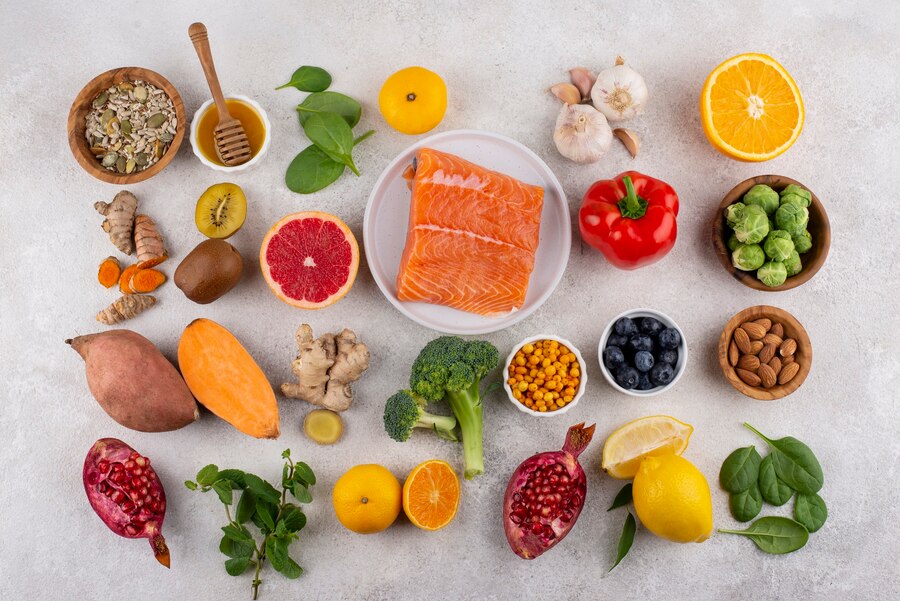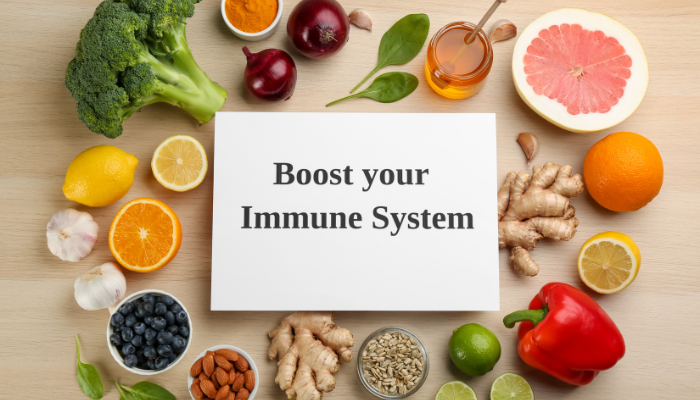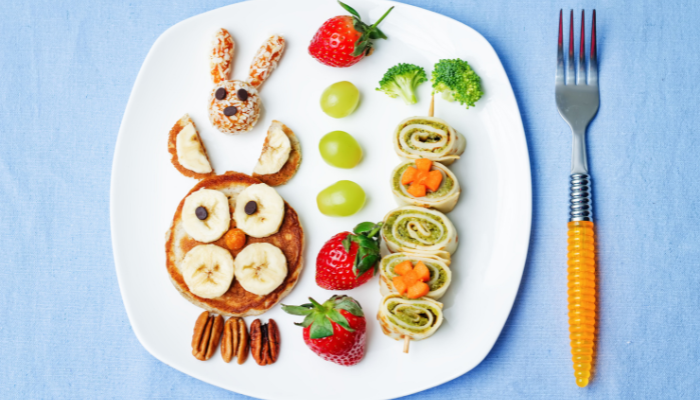
Immune-Boosting Foods for Your Little Ones:

Keeping kids healthy is a top priority for every parent, especially when it comes to building a strong immune system. Fortunately, many everyday foods are packed with nutrients that help keep your child’s immune defenses in top shape. In this guide, we’ll explore a variety of immune-boosting foods for your little ones, why these foods work so well, and simple ways to make them part of your child’s diet.
Whether you’re dealing with picky eaters, busy schedules, or seasonal sniffles, this guide offers practical solutions that make healthy eating doable. Let’s dive in!
Why Are Immune-Boosting Foods Important for Kids?
Children’s immune systems are still developing, and it’s normal for them to catch colds or other mild illnesses as their bodies learn to fight off germs. Providing immune-boosting foods supports their immune system and helps reduce the frequency or severity of illnesses.
Nutrient-rich foods are the foundation of a strong immune response, and introducing a variety of them can make a significant difference in your child’s health. Nutrients like vitamins A, C, and D, along with zinc and antioxidants, are essential to boost immunity and protect kids against infections.
1. Brightly Colored Fruits and Vegetables
Fruits and vegetables, especially those in vibrant colors, are packed with antioxidants that support immunity.
- Berries: Strawberries, blueberries, and raspberries are loaded with vitamin C and antioxidants.
- Carrots and Sweet Potatoes: These orange vegetables are high in beta-carotene, which the body converts to vitamin A—a critical nutrient for immune health.
- Leafy Greens: Spinach, kale, and Swiss chard contain vitamins C, E, and A, as well as folate, all of which support immune functions.
Tips for Parents: Try blending berries into smoothies or offering carrot sticks with a yogurt dip for a fun, nutrient-packed snack. Making vegetables exciting through dips or sauces can make a big difference!
2. Probiotic-Rich Immune-Boosting Foods
Gut health plays a huge role in immunity, and probiotic-rich foods promote a healthy balance of gut bacteria that boosts immune response.
- Yogurt: A kid-friendly option, yogurt is filled with live bacteria that help maintain a healthy gut.
- Kefir: This fermented milk drink contains more probiotics than yogurt and is often easier for kids to digest.
- Sauerkraut: Although less common in children’s diets, small amounts can be mixed with other foods to provide a probiotic boost.
Tips for Parents: Look for yogurt without added sugar, and add fruits or honey for flavor. If your child isn’t a fan of kefir, try adding it to smoothies to mask the taste.

3. Citrus Fruits
Citrus fruits like oranges, lemons, and grapefruits are famous for their vitamin C content, which enhances immune cell production.
- Oranges and Mandarins: High in vitamin C and easy to include as a snack.
- Lemons and Limes: Great for adding a bit of flavor and vitamin C to water, or squeezing over vegetables.
Tips for Parents: For a quick immune-boosting snack, pack mandarin oranges in school lunches. You can also squeeze lemon or lime over salads or veggies for an extra flavor and immune boost.
4. Garlic and Ginger
Garlic and ginger are potent immune-boosters with natural antimicrobial and anti-inflammatory properties.
- Garlic: Rich in compounds like allicin, garlic helps enhance immune cell function.
- Ginger: Known for its anti-inflammatory and antioxidant effects, ginger can soothe colds and boost immune responses.
Tips for Parents: Adding garlic to soups, sauces, and casseroles is an easy way to incorporate it into meals. For ginger, try a small amount grated into smoothies or mixed into stir-fries.
5. Nuts and Seeds
Nuts and seeds are nutrient-dense foods that provide zinc, vitamin E, and healthy fats—all essential for a strong immune system.
- Almonds and Sunflower Seeds: High in vitamin E, which is crucial for immune function.
- Pumpkin Seeds: Provide zinc, a mineral that’s known to enhance immune cell function.
Tips for Parents: Keep small bags of nuts and seeds as handy snacks. For younger kids, who may find nuts hard to chew, try sunflower butter or almond butter on apple slices.
6. Lean Proteins
Protein is critical for cell repair and immune function. Lean meats, eggs, and plant-based proteins provide the building blocks for a healthy immune system.
- Chicken and Turkey: Great sources of zinc and protein.
- Eggs: Packed with protein and also provide vitamin D, which supports immune function.
- Legumes: Beans and lentils are good plant-based options that contain zinc, fiber, and protein.
Tips for Parents: Scramble eggs with spinach or serve beans as a side dish. If your child enjoys chicken, try soups with shredded chicken for a warm, comforting, and immune-boosting meal.
7. Whole Grains
Whole grains like oats, barley, and quinoa provide fiber, which supports gut health, as well as essential nutrients like B vitamins that contribute to immune response.
- Oats: Packed with beta-glucan, a fiber that’s been shown to improve immune defenses.
- Quinoa: Rich in protein and nutrients that support immunity.
Tips for Parents: Serve oatmeal with fruit for breakfast, or use quinoa as a base for dinner bowls. Whole grains can also be added to soups or stews for extra nutrition.
8. Bright Orange Foods
Orange fruits and vegetables are often high in beta-carotene, which supports immune health by converting to vitamin A in the body.
- Pumpkin and Butternut Squash: Great sources of beta-carotene and other antioxidants.
- Papaya and Mango: Both fruits are high in vitamin C as well as beta-carotene.
Tips for Parents: Make mashed pumpkin or butternut squash as a side dish, or offer mango as a sweet snack. These bright colors are usually appealing to kids, making them more likely to try new foods!
9. Fish Rich in Omega-3s
Fatty fish, such as salmon and sardines, are high in omega-3 fatty acids, which reduce inflammation and improve immune function.
- Salmon: Provides vitamin D and omega-3s, both beneficial for immune health.
- Sardines: High in both vitamin D and omega-3s, sardines are another nutritious option.
Tips for Parents: If your child isn’t a fan of fish, try adding small pieces to pasta or rice dishes. You can also mix it into a dip to serve with crackers or veggies.
10. Hydrating Foods
Proper hydration is crucial for immune health. Water-rich fruits and vegetables like cucumbers, watermelon, and oranges help keep kids hydrated.
- Cucumber and Watermelon: Both are hydrating and contain vitamins that support immunity.
- Oranges and Berries: High in water content and vitamin C.
Tips for Parents: Offer water-based fruits as a refreshing snack, especially on hot days. For a fun twist, make fruit-infused water or homemade popsicles using pureed fruits.

Practical Tips for Parents: Making Immune-Boosting Foods a Daily Habit
Introducing immune-boosting foods doesn’t have to be overwhelming. Here are a few strategies to make it easy:
- Involve Your Child: Let kids pick a new fruit or vegetable at the grocery store, which increases the chance they’ll try it.
- Blend It Up: Smoothies are a great way to combine multiple immune-boosting foods. Use berries, yogurt, spinach, and a touch of honey for a tasty, nutrient-packed drink.
- Make It Fun: Arrange fruits and veggies into fun shapes or faces on their plates. Presentation can be key in getting kids excited about food!
- Set a Routine: Introduce a colorful plate at dinner with a variety of fruits and vegetables. Kids who regularly see these foods are more likely to try them over time.
- Lead by Example: Children learn by watching, so eating immune-boosting foods yourself can motivate them to follow suit.
Final Thoughts
Providing immune-boosting foods for your little ones doesn’t have to be complicated. By incorporating these nutrient-dense foods into their meals, you’re giving them the best possible support for their growing bodies and developing immune systems. Each small step counts, so don’t feel pressured to overhaul their diet overnight. Small, consistent changes can make a big impact over time. Here’s to happy, healthy kids with strong immune defenses!
Common Questions Parents Have About Immune-Boosting Foods
Q1: Are supplements necessary for immune health?
While food should always be the first source of nutrients, a pediatrician may recommend supplements if your child has dietary restrictions or specific needs.
Q2: How often should my child eat immune-boosting foods?
Aim to include immune-boosting foods daily as part of a balanced diet. Variety is key, as each food offers different nutrients.
Q3: My child is a picky eater. How can I make these foods appealing?
Offer choices and make foods fun by arranging them in playful ways. Involving kids in the kitchen and letting them pick ingredients can also increase their interest in new foods.
Q4: How much protein does my child need?
Protein needs vary by age, but a balanced daily intake of lean meats, eggs, dairy, or legumes is usually sufficient for most kids.
Q5: Can immune-boosting foods prevent illness?
While no food can completely prevent illness, a nutrient-rich diet helps the immune system work efficiently, which can reduce the risk or severity of infections.
Q6: Should I avoid sugar completely for better immunity?
Moderation is key. Limit added sugars and focus on whole, natural foods, as too much sugar can reduce immune function.
Read Our Latest Article: Halloween Costumes for Nursery: How to Choose the Best Outfit